Clover is a point-of-sale (POS) system that offers an all-in-one, cloud-based solution for small retailers, restaurants, and service-oriented businesses. Its POS software comes with an integrated payment processor and proprietary hardware included in each plan, plus you can integrate additional apps.
However, many Clover competitors offer different features, clearer and more flexible payment options, and varying price points that might be better suited to your business needs.
Here’s a quick rundown of what Clover does well, along with some weak points:
| PROS | CONS |
|---|---|
| Can be programmed to integrate with other payment processing services | No built-in vendor management tools |
| Subscriptions include access to proprietary hardware (with portable options) | Hardware tied to the merchant account (cannot be reprogrammed) |
| Reports are easy to generate and use | Little oversight of third-party resellers means contracts vary in quality |
| Can process card payments while offline | Requires higher plans for inventory management, advanced reports, and online sales |
Two of these weak points—lack of oversight on resellers and requirement of plan upgrades to cover missing functionality—are significant concerns for business owners looking to maximize clarity and minimize hidden costs when setting up their POS system. These shortcomings might be enough for entrepreneurs to consider other systems. Adding to that, Clover’s pricing plans are not as clear as those of many other systems.
In our evaluation, the best alternatives to Clover are:
- Square: Best overall and free
- Toast: Best for restaurants
- Shopify: Best for multichannel features and ecommerce
- Lightspeed Retail: Best for advanced inventory features
- Loyverse: Best for quick-service and hybrid restaurants
Accept payments anywhere customers are: In-person, Online, Remote, Buy Now Pay Later |

|
Top Clover Alternatives Compared
Monthly Pricing | Payment Processing Fees | Payment Processor | Standout Features | |
|---|---|---|---|---|
 | Retail POS: $13-$225 | In-person: 2.5%-2.6% + 10 cents Online: 3.5% + 10 cents | Fiserv or third-party processor |
|
 | $0-$165+ | In-person: 2.5%-2.6% + 10 cents Online: 2.9% + 30 cents | Square Payments |
|
 | $0-$69+ | Traditional: 2.49% + 15 cents Pay-as-you-go: Up to 3.69% + 15 cents | Toast Payments |
|
 | $89 for POS Pro $39-$399 for ecommerce subscription | In-person: 2.4% + 10 cents to 2.6% + 10 cents (Shopify Payments) Online: 2.5% + 30 cents to 2.9% + 30 cents (Shopify Payments) | Shopify Payments or third-party integration options |
|
 | $89-$339 (Lightspeed Retail) | In-person: 2.6% + 10 cents (Lightspeed Payments) Online: 2.6% + 30 cents (Lightspeed Payments) | Lightspeed Payments or third-party processor |
|
 | $0 (Add-ons up to $25 per location) | Varies | Third-party processor |
|
While Clover offers a popular POS system, it is best for businesses that have limited inventory management needs and plan to purchase Clover hardware from their existing merchant account.
Although Clover advertises solutions specifically for retail, restaurant, and service businesses, its limited functionality—along with pricing and contract variability among resellers—prevented it from making the following lists:
Square: Best Overall Clover Alternative

Pros
- Free subscription and card reader
- Free online store
- Can process offline payments
Cons
- Extra fees for advanced features
- Unable to manage inventory and CRM in offline mode
- Limited or inconsistent support hours
Where Square Beats Clover
- Square offers a free plan.
- Square offers more hardware and accessory options at more affordable prices than Clover.
- Unlike Clover, Square includes vendor management tools.
- Square is easier to set up and use.
What We Like
Square is Clover’s top alternative and our pick for the best POS system for small businesses. It offers similar key features to Clover, including a built-in payment processor, but beats Clover for ease of setup and use. For users looking for a free plan, more affordable subscriptions, or a greater variety of hardware with clearer pricing and functionality, Square is a better choice.
You can get started with Square for no money down if you have an iOS or Android device to run the Square app. Square is also the top pick in our guides on the leading mobile POS apps and the best free POS software. It offers basic and industry-specific POS software for restaurants, retail shops, and appointment-based businesses—all of which start with a free plan.
Some users found Clover’s pricing confusing due to the number of third-party resellers with different policies and the many possible combinations of subscriptions, software plans, and available hardware.
On the other hand, Square is very transparent with its pricing:
- Monthly POS software fee: $0 ($29-$165+ for industry-specific Plus and Premium Plans)
- Payment processing:
- In-person: 2.5% + 10 cents to 2.6% + 10 cents
- Online: 2.9% + 30 cents
- Manually keyed-in: 3.5% + 10 cents
- Custom rates available
- Hardware
- Individual devices: $0-$799
- Hardware kits: $579-$1,899
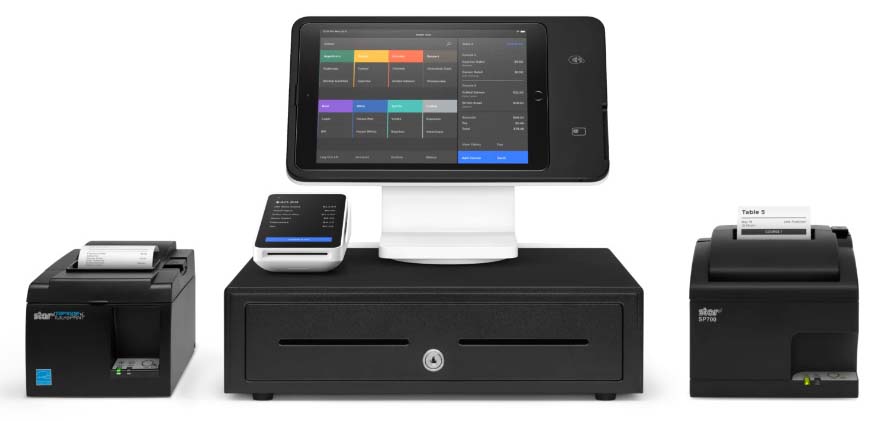
The Square Stand Restaurant Station with Square Terminal hardware kit. (Source: Square)
Square’s platform is one of the most intuitive POS systems on the market, allowing users to process transactions and manage their businesses seamlessly with a cloud-based system. It also allows you to run sales reports, collect customer information, run a loyalty program, take payments, and more. Users who outgrow the basic Square POS software also have the option to upgrade to a more industry-specific solution like Square Appointments, Square for Retail, and Square for Restaurants, each with Plus and Premium plans ranging from $165+ each month.
Specific Square features include:
- Vendor management and purchase orders
- Multichannel sales tools
- Offline payment processing
- Credit card pre-authorization
- Automated customer directory
- Social media selling integration
- Buy online, pick up in-store (BOPIS) features
Many users found Square intuitive and easy to learn and train others on. They also appreciated the transparent and affordable fees. Some users did report technical problems with payments, as well as mediocre customer support.
- Software Advice: 4.6 out of 5 based on over 2,900 reviews
- G2: 4.7 out of 5 based on nearly 800 reviews
Toast: Best Overall Clover Alternative for Restaurants

Pros
- Table and order management in base plan
- Offers a pay-as-you-go option with $0 down
- Excellent training and installation tools
Cons
- Locked into Toast’s payment processor
- Must use Toast’s proprietary hardware
- 2-year standard contract
Where Toast Beats Clover
- Toast offers a starter kit subscription with $0 startup costs. Clover has no free subscription or hardware plans.
- Toast is built specifically for restaurants and has better tools relevant to that industry, plus industry-grade hardware.
What We Like
Toast easily dominates restaurant POS systems in the market as an overall best solution and as a Clover competitor. It offers many features for full-service bars, restaurants, and even coffee shops. The baseline subscription starts with a pay-as-you-go option, so there’s $0 upfront cost, and it already includes useful features such as menu management tools. Toast also tops our lists of leading bar POS systems and quick-service restaurant (QSR) POS systems, and is generally a far more robust POS option for restaurants than Clover.
- Monthly software fee: $0-$69+
- Payment processing:
- Traditional: 2.49% + 15 cents
- Pay-as-you-go: 3.09% + 15 cents to 3.69% + 15 cents
- Hardware: $799.20+
- Pay-as-you-go option: $0 down payment with higher processing rate
Toast is a powerhouse for both front-of-house and back-of-house restaurant operations, giving you all the tools you would find in legacy, locally installed restaurant POS systems like MICROS but in a more affordable package. It offers built-in solutions—from order and table management to delivery and takeout functionalities—perfect for everything from cafes to full-service restaurants. Note that some of these solutions come as add-ons to the base plans and may require you to pay additional fees.
Toast’s top features include:
- Full-service restaurant management tools
- Customizable floor plan management
- Order and table management tools in the baseline POS plan
- Timekeeping and basic scheduling in the baseline POS plan
- Integrated digital ordering via online, mobile app, or QR code
- Quick order screens for bars
- In-house delivery and takeout app
- Multi-location management from a central dashboard
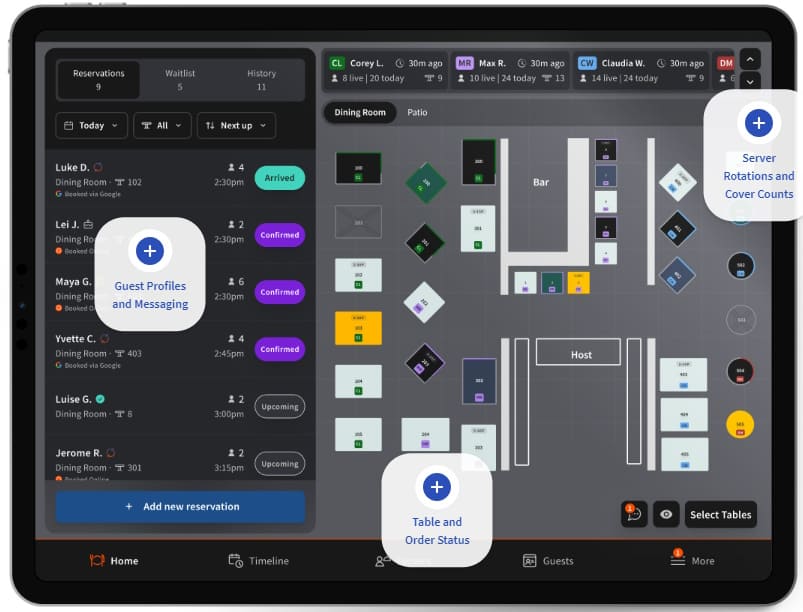
The Toast Tables feature within the POS allows servers to keep track of seating, orders, and other aspects of guest management. (Source: Toast)
Users liked Toast’s customer support, as well as the reporting tools and user-friendly interface of the POS. However, some users reported difficulties with the front-end onboarding, and frustration with needing to pay extra for certain features.
- Finances Online: Awarded the Best Restaurant Management Software award for 2021 and an overall rating of 9.50 out of 10; earns a 98% user satisfaction rating, and an average 4.6 out of 5 from user reviews
- G2: Rated 4.2 out of 5 based on more than more than 300 reviews
- Capterra: Listed as a Top Performer for 2023, and rated 4.2 out of 5 based on 500+ user reviews
Shopify: Best Clover Alternative for Ecommerce Business

Pros
- Complete online store builder included with all POS systems
- Integrated multichannel sales tools
- Extensive integration options (email marketing, loyalty, product bundlers, etc.)
Cons
- Limited offline mode functionality
- Requires plan upgrade for key features; no free plan
- Higher processing rates in Basic plan
Where Shopify Beats Clover
- Shopify provides better omnichannel features and numerous integrations.
- Shopify POS app is the top choice for creating an ecommerce website and managing online orders.
- Shopify has superior inventory management tools: stock transfers, labeling, purchase orders, and multi-location functions (though the most advanced features require a paid upgrade).
What We Like
For business owners who want a strong online presence in addition to their physical store or wish to go all-in on an ecommerce platform, Shopify stands head and shoulders above other POS systems. It is a powerhouse in the ecommerce space, leading our small business ecommerce platform recommendations, and offers one of the best retail POS platforms, whether you have an online store or a traditional brick-and-mortar shop.
Shopify provides a wealth of omnichannel features, such as tools for order management and pickup, options for buying online and exchanging or returning in-store, QR codes for more convenient online shopping, integrations for multichannel sales, and more.
- Monthly ecommerce software fee: $39–$399
- Monthly POS software fee:
- POS Lite: Included in ecommerce plan or subscribe separately for $5/month
- POS Pro: $89 per month for 1 location
- Payment processing:
- In-person: 2.4% + 10 cents to 2.6% + 10 cents (depending on your Shopify plan)
- Online: 2.5% + 30 cents to 2.9% + 30 cents
- Hardware: $49-$459
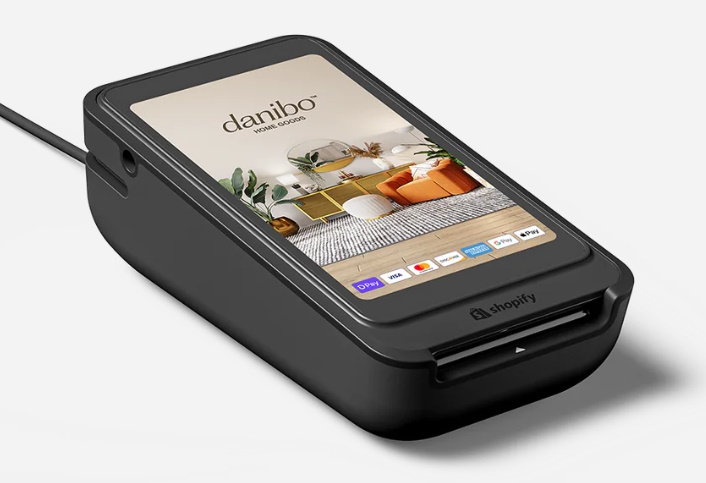
The Shopify Terminal is a countertop payment device that lets you accept card payments via tap, chip, and swipe. It includes a customizable customer-facing display and WiFi or Ethernet connectivity. (Source: Shopify)
Shopify stands out for its sophisticated yet easy-to-use website builder that integrates perfectly with Shopify’s in-store POS software, which is equipped with all the tools that business owners need to manage in-store sales. Clover POS users who prefer a stronger online presence or have a larger ecommerce sales revenue should consider Shopify as a more suitable alternative.
Specific Shopify features include:
- Integrated sales channels
- Online store builder
- Shipping tools and discounts (up to 88%)
- Integrated inventory management
- Wide range of sales channel integrations, including Amazon and TikTok
Users reported that the Shopify POS interface is easy to use and feature-rich and appreciate it as a centralized platform for all sales channels. Some users expressed frustration with cost, hardware problems, and the need for third-party apps.
- G2: 4.4 out of 5 based on over 300 reviews.
- Capterra: 4.6 out of 5 based on over 160 reviews.
Lightspeed Retail: Best Clover Alternative for Advanced Inventory Management

Pros
- Granular matrix inventory management
- Built-in ecommerce platform
- Includes an omnichannel loyalty platform (Advanced subscriptions)
Cons
- Plans can get expensive
- Plan upgrades required for advanced reporting, ecommerce tools, and integrations
Where Lightspeed Beats Clover
- Lightspeed accepts payments with built-in or third-party payment processing integration; Clover can only be configured with one payment processor.
- Lightspeed offers much more advanced inventory management tools.
What We Like
Lightspeed offers POS systems for retail and restaurant businesses, along with an ecommerce platform comparable to big names like Shopify and BigCommerce. Its granular matrix inventory management tools surpass competitors like Clover, earning its place as our top-recommended POS for inventory management.
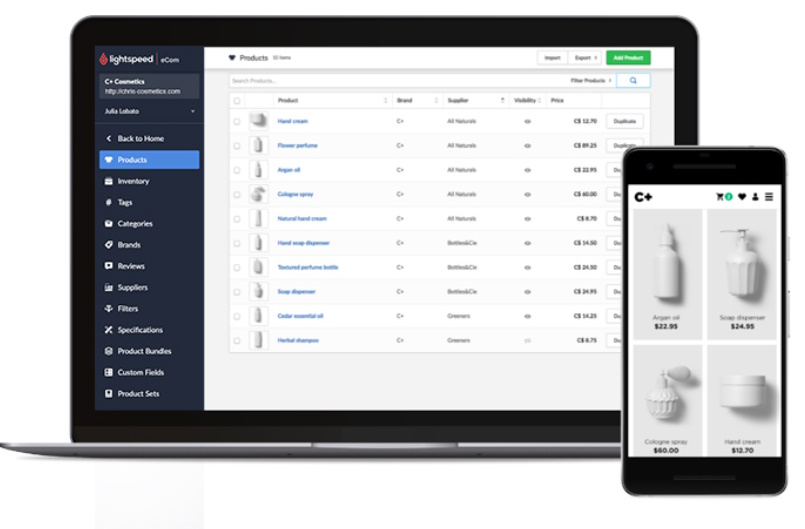
Lightspeed for Retail offers exemplary inventory tools, including purchase order management, all synced and accessible on multiple devices. (Source: Lightspeed)
Lightspeed allows you to accept payments with its built-in payment processor Lightspeed Payments and third-party payment processing integration in its more advanced plans. Overall, it offers more flexibility with processors and hardware reprogramming than Clover does.
Finally, Lightspeed is also Retail Access Control Standards (RACS)-compliant and has age verification, putting it on our lists of best vape shop POS solutions and top liquor store POS systems.
- Monthly software fee: $89–$339 (Lightspeed Retail)
- Payment processing:
- In-person: 2.6% + 10 cents (Lightspeed Payments)
- Online: 2.6% + 30 cents (Lightspeed Payments)
- Hardware: Custom-quoted
Lightspeed gives its users the ability to access back-office management, accounting, and online reporting tools. Flexible features allow users to customize the system for various retail and restaurant businesses easily.
Lightspeed’s top features include:
- Customizable advanced matrix inventory
- Third-party payment processing integrations (with extra fee)
- Built-in purchase ordering
- Supply chain management
- Multi-location management
- Built-in product catalogs
Users appreciated Lightspeed’s excellent inventory management, ease of use, reliability, and advanced features in general. Some users experienced frustration with customer support and pricing.
- G2: 4.0 out of 5 based on about 280+ reviews
- Capterra: 4.1 out of 5 based on nearly 1000 reviews
Loyverse: Best Clover Alternative for Small Hybrid Restaurants

Pros
- Free software with built-in loyalty program
- Supports retail and restaurant inventory management
- Built-in purchase ordering (Advanced plan)
- Mobile app that works on iOS and Android devices
Cons
- Third-party integrations required for full-service restaurant features
- Must use third-party payment processing merchant
Where Loyverse Beats Clover
- Loyverse offers a free Kitchen Display System (KDS) app. With Clover, you must pay an upfront hardware fee as well as a monthly software fee.
- Loyverse’s inventory management system includes images for quick product identification, unlike Clover.
- Loyverse offers more flexibility with hardware, with no need for proprietary devices.
- Loyverse has no fixed contract length or vendor lock-in; with Clover, terms of service depend on your chosen merchant service provider.
What We Like
Loyverse has a free POS plan, while Clover’s subscriptions start at $13 per month. Given that both systems have comparable features for restaurant businesses, Loyverse’s free subscription is a major advantage over Clover.
Loyverse is the only free POS system with a built-in loyalty program. It also offers business management tools supporting both retail shops and restaurants, making it an ideal solution for small hybrid cafes and quick-service restaurants. You will need to find your own payment processor, but unlike Clover, Loyverse does not require proprietary hardware, so you have more flexibility in choosing a provider.
- Monthly software fee: $0 (paid add-ons available for $5–$25 per month per location)
- Payment processing: Varies based on processor
- Hardware: Costs vary; no proprietary hardware
Loyverse also includes paid add-ons that enhance the base POS system:
- Employee management tools: $5 per month per employee with 14-day free trial
- Advanced inventory tools: $25 per month per location with 14-day free trial
- Various integrations and apps (accounting, ecommerce, marketing, online ordering): App developers charge varying fees
Loyverse offers solid POS and inventory management tools for small food-based establishments that also sell retail products. You get access to menu customization, ticket management tools, barcode scanning, and bulk inventory upload features. Loyverse also integrates with popular payment providers like SumUp and PayPal Zettle.
Specific Loyverse features include:
- Free POS app for iOS and Android
- Barcode scanning and bulk inventory uploading (CSV)
- Menu modifications and management
- Offline mode
- Customer display support and a free dedicated app for Kitchen Display System
- Order management tools
- Stock management including inventory count
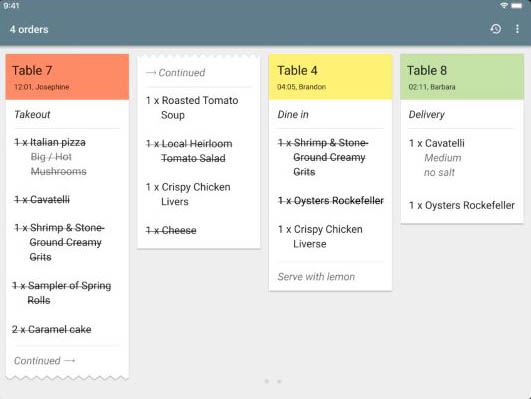
Loyverse has a free, dedicated KDS app. (Source: Loyverse)
Loyverse users liked the free POS plan, ease of setup and use, and good reporting tools. Some users noted missing staff management and online ordering features, as well as inefficiencies in the inventory management.
- Capterra: 4.8 out of 5 stars based on more than 450reviews
- G2: 4.7 out of 5 stars based on about 16 reviews
How to Choose a Clover Alternative
While Clover has its advantages—namely its proprietary hardware and its flexibility for use in various industries—it has its share of downsides. The pricing plans can be confusing or unclear, and the number of resellers and sources from which you can get the hardware and software make it difficult to ensure quality. You’ll also need lots of third-party apps if you want access to advanced functionality.
Businesses looking for a comparable but different POS system should consider the following steps when deciding on an alternative.
Step 1: Choose a Suitable POS for Your Business Type
While some POS systems (such as Square) can work well for businesses in various industries, some other systems are designed for particular industries, (such as Toast, for restaurants). Whatever POS system to decide on, be sure that it has features that serve your specific business needs.
Restaurants will want features like table management and food delivery, while ecommerce shops should look for strong website-building tools, shipping options, and social media integrations. Service-oriented businesses like pest control or salons will need scheduling tools and robust employee management features for blocking off appointment times and the like.
Step 2: Decide What You are Willing to Pay for Upfront or Monthly
While Clover has flexibility in its plans, its pricing scheme can be rather unclear; it has varying upfront and monthly payments not only for different subscription levels but for different industries. For example, a retail shop wanting Clover’s standard subscription will end up paying different fees than a full-service restaurant that also goes with Clover’s standard subscription.
Check Clover’s website to gain some clarity on the various monthly subscriptions and fees open to you. You can also read through our Clover pricing guide for detailed pricing breakdowns. Then, choose a system that offers upfront and monthly fees acceptable to you. For example, Toast offers an option for $0 percent down payment on hardware; but you’ll need to accept higher payment processing rates.
Step 3: Decide the Terms You Want for Hardware
Finally, think about the hardware options that you want and are willing to pay for. Clover does offer its own line of hardware, which means that these devices are purpose-built to run the Clover software and you can expect them to be reliable. However, some users may wish to not be tied down to a single provider’s hardware options. Note that you can only choose your payment processor once; after your account has been configured, you cannot change processors unless you’re willing to open a new Clover account and buy the hardware again.
Fortunately, there’s a lot of flexibility here: Square and Shopify, for example, offer their own branded hardware devices, but don’t require these in order to use the software. Lightspeed offers complete kits that you’ll need to get a custom quote for. Loyverse, on the other hand, doesn’t offer proprietary hardware at all, though it works on iPads and many Android POS terminals.
Frequently Asked Questions (FAQ)
Read through the sections below to learn more about Clover’s charges, as well as alternatives to this POS system.
This depends on the type of business you run and the specific needs that come with it. Overall, we recommend Square POS as the best overall solution for small retail businesses; Toast as the best restaurant POS; and Shopify for ecommerce.
Unfortunately, Clover does not offer a free option. If you need a free POS system, we recommend Square. Square is completely free for a single location and has all the tools you need to conduct sales and manage your store.
For card-present transactions, Clover charges 2.3%–2.6% + 10 cents when you use Fiserv as your payment processor and purchase hardware through Clover. The exact amount will depend on the type of business you are running—retail, restaurant, or service industry.
Bottom Line
Clover POS offers a complete business solution, from software and hardware to credit card payment processing. However, it locks you into contracts, may include hidden fees, and could be more expensive than a small business can afford.
Among all the Clover competitors, Square gives you more features and flexibility at a fraction of the cost, even with its paid plans. Additionally, it gets constant high marks for affordability and ease of use. For these reasons, Square is our top POS recommendation for a Clover alternative. Visit Square to create a free account.